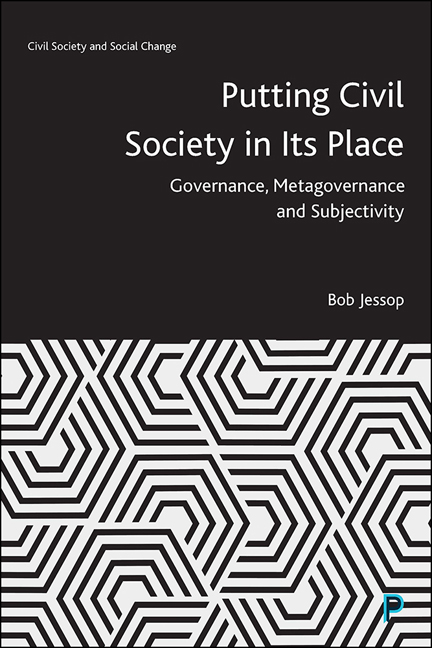Book contents
- Frontmatter
- Dedication
- Contents
- List of Tables and Figures
- Abbreviations
- Note on the Author
- Acknowledgements
- Licensing Information
- Preface
- 1 Introduction
- Part I Complexity, Contingency and Governance
- Part II Locating Civil Society as a Mode of Governance
- Part III Governance Failure and Metagovernance
- Endnotes
- References
- Index
8 - The Multispatial Governance of Social and Economic Policy
Published online by Cambridge University Press: 18 March 2021
- Frontmatter
- Dedication
- Contents
- List of Tables and Figures
- Abbreviations
- Note on the Author
- Acknowledgements
- Licensing Information
- Preface
- 1 Introduction
- Part I Complexity, Contingency and Governance
- Part II Locating Civil Society as a Mode of Governance
- Part III Governance Failure and Metagovernance
- Endnotes
- References
- Index
Summary
There has been much talk of civil society in the past 30–40 years or so. This occurred not only during the crisis of state socialism in the Soviet bloc and the initial construction of post-socialist societies, but also in the heartlands of advanced capitalism. But does this mean that ‘civil society’ has become a really existing unified, extra-discursive phenomenon? Does it mean that there are major shifts in the residual space that has been conventionally described as ‘civil society’ and that these have important implications for economic, political and social struggles? Or does it mean only that major changes have occurred in the ‘self-understanding’ and ‘self-description’ of society and that these are reflected in the renewed discourse of ‘civil society? My view, based on the theoretical arguments above and on current accounts of these changes, is that there is still no unified ‘civil society’. This is reflected in the interest in civic stratification, civic deficits and civic repair in the current period of the WISERD research centre. This Lockwoodian interest is concerned with the interdependence of capitalist relations and citizenship or status relations and hence in the role of civil society in liberal bourgeois democracy. It identifies the endemic contradiction between citizenship and capital that has so far been managed by the fine-tuning of social rights (Lockwood, 1999: 535).
Economics and politics
Lockwood's approach to civic stratification is grounded in the Marshallian approach to citizenship rights and deficits (Marshall, 1950). But there have been significant changes in the relations between what one might, following Habermas, call the system world and the lifeworld, and these have major implications for the roles of state and politics (Habermas, 1984, 1987, 1989). Moreover, in Luhmannian terms, these changes can be described in terms of the increased functional differentiation of modern societies (thereby producing a paradoxical combination of greater operational autonomy for individual functional subsystems or institutional orders and greater social, material and temporal interdependence among them) and in terms of the greater significance of identities as a means to reduce the increased complexity of the system world, and to provide a basis for self-description and self-reflexion about the impact of these changes on values and interests.
- Type
- Chapter
- Information
- Putting Civil Society in Its PlaceGovernance, Metagovernance and Subjectivity, pp. 155 - 174Publisher: Bristol University PressPrint publication year: 2020

